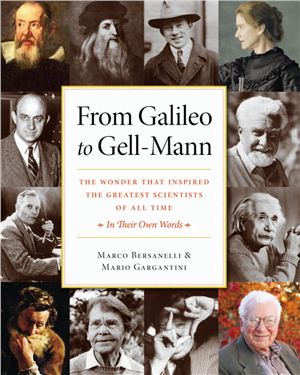Templeton Press, 2009, 320 pages
From time to time, the diligent science student huddled over dense volumes of research findings and highly technical data will stumble upon a truly rare treasure: the author’s answer to the question of, Why? Why did the authors of these volumes commit themselves so ardently to life in the laboratory? What was it that motivated them to keep their eye to microscope for years on end? Why did the world’s greatest scientists devote their lives to research—an endeavor where failure is the exponentially more likely outcome than success?
In their new anthology, From Galileo to Gell-Mann, Marco Bersanelli and Mario Gargantini have gathered the answers to these fascinating questions from over one hundred of the brightest scientific minds from our past and our present. It is a goldmine of insight that previously could only to be found hidden deep within thousands of scattershot pages of footnotes from out-of-print jouals, rare books, and unpublished papers. Throughout the work, Bersanelli and Gargantini also offer insightful commentary and discussion on the readings.
Among the most remarkable similarities that emerge when one considers together these writings from the likes of Albert Einstein, Gregor Mendel, Marie Curie, and others, is the sense of wonder and outright awe at what the study of the natural world can reveal. From Galileo to Gell-Mann makes it clear that science and all parallel attempts to understand our human existence—including fields like philosophy to theology—are viewed as nothing less than grand adventures to those that are probing the limits of what we know.
From time to time, the diligent science student huddled over dense volumes of research findings and highly technical data will stumble upon a truly rare treasure: the author’s answer to the question of, Why? Why did the authors of these volumes commit themselves so ardently to life in the laboratory? What was it that motivated them to keep their eye to microscope for years on end? Why did the world’s greatest scientists devote their lives to research—an endeavor where failure is the exponentially more likely outcome than success?
In their new anthology, From Galileo to Gell-Mann, Marco Bersanelli and Mario Gargantini have gathered the answers to these fascinating questions from over one hundred of the brightest scientific minds from our past and our present. It is a goldmine of insight that previously could only to be found hidden deep within thousands of scattershot pages of footnotes from out-of-print jouals, rare books, and unpublished papers. Throughout the work, Bersanelli and Gargantini also offer insightful commentary and discussion on the readings.
Among the most remarkable similarities that emerge when one considers together these writings from the likes of Albert Einstein, Gregor Mendel, Marie Curie, and others, is the sense of wonder and outright awe at what the study of the natural world can reveal. From Galileo to Gell-Mann makes it clear that science and all parallel attempts to understand our human existence—including fields like philosophy to theology—are viewed as nothing less than grand adventures to those that are probing the limits of what we know.

